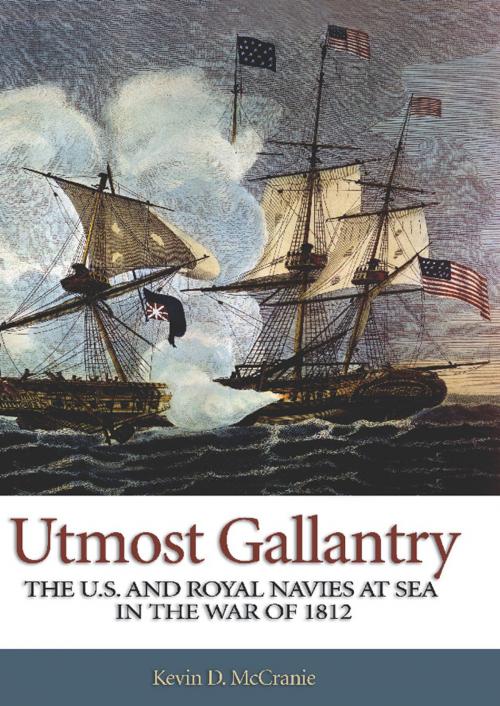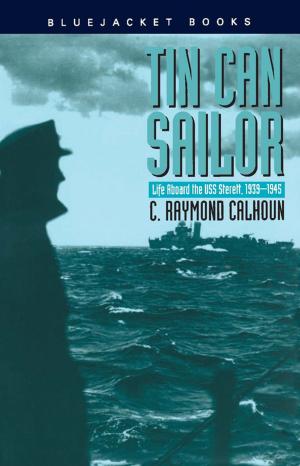Utmost Gallantry
The U.S. and Royal Navies at Sea in the War of 1812
Nonfiction, History, Military, Naval| Author: | Kevin D. McCranie | ISBN: | 9781612510637 |
| Publisher: | Naval Institute Press | Publication: | October 1, 2011 |
| Imprint: | Naval Institute Press | Language: | English |
| Author: | Kevin D. McCranie |
| ISBN: | 9781612510637 |
| Publisher: | Naval Institute Press |
| Publication: | October 1, 2011 |
| Imprint: | Naval Institute Press |
| Language: | English |
Focusing on the oceanic war rather than the war in the Great Lakes, this study charts the War of 1812 from the perspectives of the two opposing navies at sea-one of the largest fleets in the world and a small, upstart navy just three decades old. While American naval leadership searched for a means of contesting Britain’s naval dominance, the English sought to destroy the U.S. Navy and protect its oceanic highways. Instead of describing battles between opposing warships, McCranie evaluates entire cruises by American and British men-of-war, noting both successes and failures and how they translated into broader strategies. In the process, his study becomes a history of how the two navies fought the oceanic war, linking high-level governmental decisions about strategy to the operational use of fleets in the Atlantic and Caribbean and from the South Pacific to the Indian Ocean.
Unlike other books on the subject, this work offers a balanced appraisal of the oceanic war on the high seas, taking into account the strategic considerations of both combatants and how the leadership from each side assessed, planned, and implemented operational concepts. Drawing on a wealth of British and American archival sources, McCranie guides the reader through the strategic decision making processes on both sides of the Atlantic. He demonstrates vividly the impact of those decisions on the course of the war at sea, where the contest was close and deadly. Indeed, the author’s action-packed accounts of battles hold special appeal.
This study offers a more balanced appraisal of the war than most studies of the topic. Particularly important is the stress on understanding British strategic imperatives and the correlation between these imperatives and why Britain conducted the oceanic naval war in the manner it did. This study focuses on all cruises of American warships, not just those that terminated in battles so as to provide a more complete history of the naval war.
Focusing on the oceanic war rather than the war in the Great Lakes, this study charts the War of 1812 from the perspectives of the two opposing navies at sea-one of the largest fleets in the world and a small, upstart navy just three decades old. While American naval leadership searched for a means of contesting Britain’s naval dominance, the English sought to destroy the U.S. Navy and protect its oceanic highways. Instead of describing battles between opposing warships, McCranie evaluates entire cruises by American and British men-of-war, noting both successes and failures and how they translated into broader strategies. In the process, his study becomes a history of how the two navies fought the oceanic war, linking high-level governmental decisions about strategy to the operational use of fleets in the Atlantic and Caribbean and from the South Pacific to the Indian Ocean.
Unlike other books on the subject, this work offers a balanced appraisal of the oceanic war on the high seas, taking into account the strategic considerations of both combatants and how the leadership from each side assessed, planned, and implemented operational concepts. Drawing on a wealth of British and American archival sources, McCranie guides the reader through the strategic decision making processes on both sides of the Atlantic. He demonstrates vividly the impact of those decisions on the course of the war at sea, where the contest was close and deadly. Indeed, the author’s action-packed accounts of battles hold special appeal.
This study offers a more balanced appraisal of the war than most studies of the topic. Particularly important is the stress on understanding British strategic imperatives and the correlation between these imperatives and why Britain conducted the oceanic naval war in the manner it did. This study focuses on all cruises of American warships, not just those that terminated in battles so as to provide a more complete history of the naval war.















